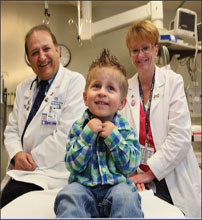 Code launched in April 2012 to help infants admitted to emergency department; named after 2-year-old Caleb Peltier of Vista
Code launched in April 2012 to help infants admitted to emergency department; named after 2-year-old Caleb Peltier of Vista
OCEANSIDE – April 5 marks the first full year of Code Caleb, the newborn emergency code developed by Tri-City Medical Center to help improve the odds of survival for its youngest, most critical patients—infants.
Code Caleb is called when infants 60 days or younger arrive in the emergency department needing resuscitation and immediately pages the available neonatologist, neonatal nurse and respiratory therapist to respond.
Because Tri-City Medical Center trained first responders to familiarize them with the code prior to its launch last April, Code Caleb can also be called by paramedics and EMTs in the field.
With nine Code Calebs recorded during its first year, Tri-City Medical Center is now sharing the results with peer medical centers in San Diego County and across the state as well as with the California Chapter of March of Dimes. Tri-City Medical Center is doing this to help raise awareness and standardize the practice across all providers statewide.
“It is extremely important to timely and properly diagnose Code Caleb cases, ensure that the right medical experts are available at the right time and equip them with the right equipment for these tiny patients,” explained Tri-City Medical Center NICU manager and registered nurse Nancy Myers, who authored Code Caleb. “For this reason, it is essential that a consistent, well-accepted process for responding to them be in place when they do occur.”
The code’s namesake is 2-year-old Caleb Peltier of Vista who was resuscitated at Tri-City Medical Center in 2010 when he was only 3 days old. Tri-City neonatologist and pediatric cardiologist Dr. Hamid Movahhedian diagnosed his congenital heart defect. With the support of Tri-City Medical Center, the Peltier family, March of Dimes and then-Assemblyman Marty Block successfully lobbied for Assembly Bill 1731. Signed into law in September 2012 by Governor of California Jerry Brown, it requires a pulse oximetry test for the identification of critical congenital heart disease in newborns at California acute care hospitals with a licensed perinatal service. The screening will be in effect statewide beginning on July 1. Congenital heart disease is the most common cause of death in the first year of life and accounts for 3 percent of all infant deaths and more than 40 percent of all deaths due to congenital malformations.
“We have seen firsthand the power of Caleb’s story and the work of the hospital to implement Code Caleb,” said Karyn DeMartini, state director of the California Chapter of March of Dimes. “March of Dimes recognizes the importance that hospitals who receive newborns have the training and capability to resuscitate and identify potential life-threatening conditions. Code Caleb has shown promise in achieving these goals.”
Prior to Code Caleb, Tri-City Medical Center’s Code Pink was used for all pediatric emergencies and did not page the neonatal team specifically.
Conditions requiring specialized neonatal emergency care and leading to a Code Caleb can include symptomatic hypoglycemia sepsis, hypothermia, seizure, respiratory distress / failure, anaphylaxis, cardiac rhythm disturbances, shock, preterm and emergent delivery, and cyanotic episodes.
As part of Tri-City Medical Center’s commitment to the health and wellbeing of newborns in the community, it has also been a participant in the March of Dimes Oceanside March for Babies since 2010, which will take place this year on April 13. Tri-City Medical Center has pledged $55,000 in support of this year’s March of Dimes campaign to raise funds adding to the $120,000 it has raised since 2010.




